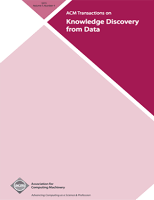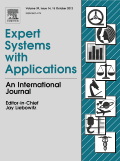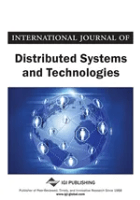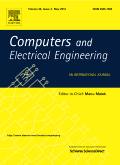
Intelligent Data Analysis
Scope & Guideline
Connecting Minds to Revolutionize Data Analysis
Introduction
Aims and Scopes
- Machine Learning and Artificial Intelligence:
The journal publishes research on machine learning algorithms, including supervised, unsupervised, and reinforcement learning techniques, highlighting their applications across diverse fields such as healthcare, finance, and social networks. - Data Mining and Knowledge Discovery:
A significant focus is placed on data mining techniques aimed at discovering patterns, trends, and insights from large datasets, with methodologies including clustering, classification, and association rule mining. - Big Data Analytics:
Papers often explore the challenges and solutions related to processing and analyzing big data, including the use of distributed computing and advanced statistical methods to derive meaningful insights. - Predictive Analytics and Decision Support Systems:
Research includes the development of predictive models and decision support systems that leverage historical data to inform future actions, particularly in domains such as healthcare, finance, and urban planning. - Graph and Network Analysis:
The analysis of complex networks and relationships, including social networks, biological networks, and transportation systems, is a recurring theme, employing graph theory and network-based algorithms. - Natural Language Processing and Text Mining:
The journal covers advancements in natural language processing (NLP), focusing on techniques for text classification, sentiment analysis, and information extraction from unstructured data. - Time Series Analysis and Forecasting:
Research on methodologies for time series forecasting and anomaly detection is prevalent, addressing applications in finance, healthcare monitoring, and environmental data.
Trending and Emerging
- Deep Learning Approaches:
There is a significant increase in publications leveraging deep learning techniques, particularly in areas such as image processing, natural language processing, and time series forecasting, showcasing their effectiveness in handling complex data. - Explainable AI (XAI):
The growing demand for transparency in AI models has led to an increase in research focused on explainable AI, aiming to make machine learning models interpretable and understandable to users. - Federated Learning and Privacy-Preserving Techniques:
Emerging themes include federated learning and other privacy-preserving techniques, which are essential for analyzing sensitive data while maintaining user privacy. - Transfer Learning and Domain Adaptation:
Research on transfer learning and domain adaptation techniques is gaining traction, particularly in scenarios where labeled data is scarce, allowing for knowledge transfer from related domains. - Integration of IoT and Data Analytics:
The intersection of Internet of Things (IoT) technology and data analytics is a rising theme, focusing on real-time data processing and analysis from connected devices for smart applications. - Anomaly Detection and Predictive Maintenance:
There is an increasing focus on anomaly detection techniques, particularly in industrial applications, where predictive maintenance is critical for operational efficiency.
Declining or Waning
- Traditional Statistical Methods:
There has been a noticeable decrease in the publication of papers focused on traditional statistical techniques, as the field shifts towards more complex machine learning and deep learning methodologies. - Rule-Based Systems:
Research centered on rule-based approaches for data analysis is becoming less prevalent, with a growing preference for data-driven methods that leverage learning algorithms. - Basic Data Visualization Techniques:
Papers that primarily focus on basic data visualization techniques without integrating them into more complex analytical frameworks are appearing less frequently. - Classical Optimization Algorithms:
There is a waning interest in classical optimization algorithms in favor of more sophisticated metaheuristic and evolutionary algorithms that offer better performance in complex scenarios. - Static Data Analysis:
The focus on static data analysis methods is declining as dynamic and real-time data processing becomes more critical in applications across various domains.
Similar Journals

DATA & KNOWLEDGE ENGINEERING
Unveiling Insights through Rigorous Data AnalysisData & Knowledge Engineering is a prestigious, peer-reviewed journal dedicated to the fields of data management, information systems, and knowledge engineering. Published by Elsevier in the Netherlands, this journal serves as a critical resource for researchers, professionals, and students alike, offering a platform for high-quality, original research and innovative approaches in the realm of data-driven technologies and methodologies. With a considerable impact factor and classified in the Q2 quartile for Information Systems and Management, it ranks 47th out of 148 journals in its category, placing it in the esteemed 68th percentile according to Scopus metrics. Data & Knowledge Engineering covers a wide array of topics including database systems, data mining, and knowledge representation, ensuring that it remains at the forefront of advancing understanding and application in these dynamic fields. Engage with compelling articles and significant findings published since its inception in 1985, as the journal continues to shape the future of data-centric research up to 2024 and beyond.

Data Science and Engineering
Pioneering insights in artificial intelligence and beyond.Data Science and Engineering is a premier open access journal published by SPRINGERNATURE, dedicated to advancing the fields of data science, artificial intelligence, computational mechanics, and information systems. Since its inception in 2016, this journal has rapidly established itself as a leader in the academic community, boasting an impressive Q1 ranking in multiple computer science categories, including Artificial Intelligence, Software, and Information Systems. With a commitment to disseminating high-quality research, it caters to a diverse audience of researchers, professionals, and students eager to explore the intersection of data and technology. The journal's robust global reach, combined with its respected reputation, empowers authors to share their findings widely, facilitating breakthroughs and innovations across the digital landscape. Join the vibrant community of scholars contributing to this integral field of study, and stay informed with the latest research by accessing the journal freely online.

ACM Transactions on Knowledge Discovery from Data
Unlocking Insights, Transforming Data into KnowledgeACM Transactions on Knowledge Discovery from Data (TKDD), published by the Association for Computing Machinery, is a prestigious journal at the forefront of the interdisciplinary realm of data mining and knowledge discovery. With an impressive Q1 ranking in Computer Science and a Scopus rank of #43 out of 232, this journal stands out as a top-tier resource for innovative research that addresses complex challenges in data science. Covering impactful studies from 2007 to 2024, TKDD presents cutting-edge algorithms, methodologies, and applications that shape the future of knowledge extraction from vast datasets. While not an open-access journal, it provides a platform for researchers, professionals, and students to disseminate their findings and engage with the latest advancements in this rapidly evolving field. By fostering collaboration and knowledge sharing, TKDD plays a vital role in advancing the understanding and application of data analysis techniques, making it an essential read for anyone involved in the pursuit of knowledge from data.

EXPERT SYSTEMS WITH APPLICATIONS
Fostering Interdisciplinary Insights for TomorrowEXPERT SYSTEMS WITH APPLICATIONS is a premier journal published by PERGAMON-ELSEVIER SCIENCE LTD, dedicated to showcasing cutting-edge research in the fields of Artificial Intelligence, Computer Science Applications, and Engineering. With an esteemed Q1 ranking across multiple categories, this journal not only reflects high-quality scholarship but also plays a pivotal role in advancing the application of expert systems and intelligent technologies in various sectors. Operating from the United Kingdom, it features a wide range of insightful articles that address complex challenges and offer innovative solutions through interdisciplinary approaches. Researchers and practitioners can access invaluable resources to inform their work, contributing to the journal's strong reputation and growing readership. With its convergence of relevant technologies from 1990 to 2025, EXPERT SYSTEMS WITH APPLICATIONS stands as an essential source for those aiming to push the boundaries of knowledge in these thriving fields, making it a key platform for both established experts and emerging scholars.

KNOWLEDGE AND INFORMATION SYSTEMS
Transforming Ideas into Impactful SolutionsKNOWLEDGE AND INFORMATION SYSTEMS, published by SPRINGER LONDON LTD, is a distinguished journal in the field of information systems, artificial intelligence, and human-computer interaction. With its ISSN 0219-1377 and E-ISSN 0219-3116, this journal has built a robust reputation since its inception, featuring a convergence of valuable research from 2005 through 2024. Catering to a diverse academic audience, it is classified among the leading journals in its category, proudly holding a Q1 ranking in Information Systems and Q2 rankings in multiple other domains. The journal aims to publish cutting-edge research that not only advances theoretical understanding but also provides practical applications within these rapidly evolving fields. Although it is not an Open Access journal, subscribers can access a wealth of knowledge critical for researchers, practitioners, and students looking to enhance their expertise. With a 2023 Scopus rank placing it within the 66th percentile for Information Systems, KNOWLEDGE AND INFORMATION SYSTEMS is an invaluable resource for those committed to pushing the frontiers of knowledge in technology and information science.

International Arab Journal of Information Technology
Empowering Research, Shaping the Future of ITWelcome to the International Arab Journal of Information Technology, a prestigious publication under the aegis of ZARKA PRIVATE UNIVERSITY in Jordan, dedicated to advancing the field of Information Technology. First established in 2008, this journal has made significant strides in disseminating high-quality research, achieving an impressive Q2 ranking in Computer Science (miscellaneous) and securing a notable 57th percentile position in the Scopus rankings. With a comprehensive scope encompassing various sub-disciplines of computer science, the journal is committed to promoting scholarly dialogue and innovation among researchers, professionals, and students. While currently operating as a subscription-only journal, it remains a vital resource for the academic community seeking to explore the latest trends and advancements in technology. The International Arab Journal of Information Technology is not only a platform for original research but also a vibrant hub for ideas that shape the technological landscape of the Arab region and beyond.

International Journal of Distributed Systems and Technologies
Unveiling Insights into the World of Distributed Technologies.Welcome to the International Journal of Distributed Systems and Technologies, a prominent academic platform published by IGI Global dedicated to advancing the field of distributed systems and technologies. With an ISSN of 1947-3532 and an E-ISSN of 1947-3540, this journal, established in 2010 and continuing through 2024, offers a unique venue for researchers, professionals, and students to disseminate their findings in the realms of computer networks, communications, hardware, and architecture. Despite its current placement in the Q4 quartile for both computer networks and communications and hardware and architecture categories in 2023, the journal is committed to fostering innovative solutions and interdisciplinary collaboration that can drive future advancements. Although not open access, contributions to this journal not only receive rigorous peer review but also have the potential to significantly impact the community, underscored by a focus on applicable research that addresses the emerging challenges in technology. As part of a rich repository, the journal invites you to explore its latest issues and join in shaping the future of distributed systems.

DATA MINING AND KNOWLEDGE DISCOVERY
Harnessing Innovation to Decode Complex Data SystemsDATA MINING AND KNOWLEDGE DISCOVERY, published by Springer, stands as a premier journal within the realms of Computer Networks and Communications, Computer Science Applications, and Information Systems. With an impressive impact factor and a notable presence in various rankings—achieving the Q1 category in 2023—we invite researchers, professionals, and students alike to explore cutting-edge methodologies and innovative applications in data mining. Established in 1997 and continuing its journey through to 2024, the journal not only contributes significantly to the advancement of knowledge in computational techniques but also fosters an understanding of the complex interrelations in data systems. Though not an open access publication, it offers a wealth of insights crucial for driving advancements in technology and analytics. Based in Dordrecht, Netherlands, the journal remains dedicated to disseminating high-quality research and is essential reading for anyone engaged in the ever-evolving field of data science.

COMPUTERS & ELECTRICAL ENGINEERING
Empowering Innovation in Technology and Engineering.COMPUTERS & ELECTRICAL ENGINEERING is a premier academic journal published by PERGAMON-ELSEVIER SCIENCE LTD, based in the United Kingdom. Established in 1973, the journal has consistently contributed to the fields of Computer Science, Control and Systems Engineering, and Electrical and Electronic Engineering. With an impressive impact factor and ranked in the top quartile (Q1) across these domains, it is recognized as a pivotal resource for researchers, practitioners, and students alike. The journal aims to disseminate high-quality research articles, reviews, and technical notes, with the goal of advancing understanding and fostering innovation within and beyond its scope. Researchers can enjoy unparalleled access to cutting-edge findings and technological advancements through contributions that span both theoretical frameworks and practical applications, making it an essential platform for anyone dedicated to exploring the intersections of these dynamic fields.

JOURNAL OF INTELLIGENT INFORMATION SYSTEMS
Bridging Academia and Industry in Intelligent SolutionsThe Journal of Intelligent Information Systems, published by Springer since 1992, is a premier academic journal that offers a multidisciplinary platform in the fields of Artificial Intelligence, Computer Networks and Communications, Hardware and Architecture, Information Systems, and Software. With an impressive impact reflected in its 2023 Q2 category rankings across multiple domains and a commendable standing in the Scopus Rankings—ranking #84 in Computer Networks and Communications and #101 in Artificial Intelligence—the journal is recognized for its contribution to advancing knowledge and innovation. Although it is not an open-access journal, its accessibility through institutional subscriptions ensures that a wide range of researchers, professionals, and students can engage with high-quality, peer-reviewed research that addresses the latest advancements and trends in intelligent systems. For over three decades, this journal has effectively bridged gaps between academia and industry, making it a vital resource for those aiming to push boundaries in intelligent information systems.